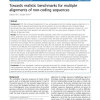Free Online Productivity Tools
i2Speak
i2Symbol
i2OCR
iTex2Img
iWeb2Print
iWeb2Shot
i2Type
iPdf2Split
iPdf2Merge
i2Bopomofo
i2Arabic
i2Style
i2Image
i2PDF
iLatex2Rtf
Sci2ools
148
click to vote
BMCBI
2010
2010
Towards realistic benchmarks for multiple alignments of non-coding sequences
Background: With the continued development of new computational tools for multiple sequence alignment, it is necessary today to develop benchmarks that aid the selection of the most effective tools. Simulation-based benchmarks have been proposed to meet this necessity, especially for non-coding sequences. However, it is not clear if such benchmarks truly represent real sequence data from any given group of species, in terms of the difficulty of alignment tasks. Results: We find that the conventional simulation approach, which relies on empirically estimated values for various parameters such as substitution rate or insertion/deletion rates, is unable to generate synthetic sequences reflecting the broad genomic variation in conservation levels. We tackle this problem with a new method for simulating non-coding sequence evolution, by relying on genome-wide distributions of evolutionary parameters rather than their averages. We then generate synthetic data sets to mimic orthologous seque...
| Added | 08 Dec 2010 |
| Updated | 08 Dec 2010 |
| Type | Journal |
| Year | 2010 |
| Where | BMCBI |
| Authors | Jaebum Kim, Saurabh Sinha |
Comments (0)

